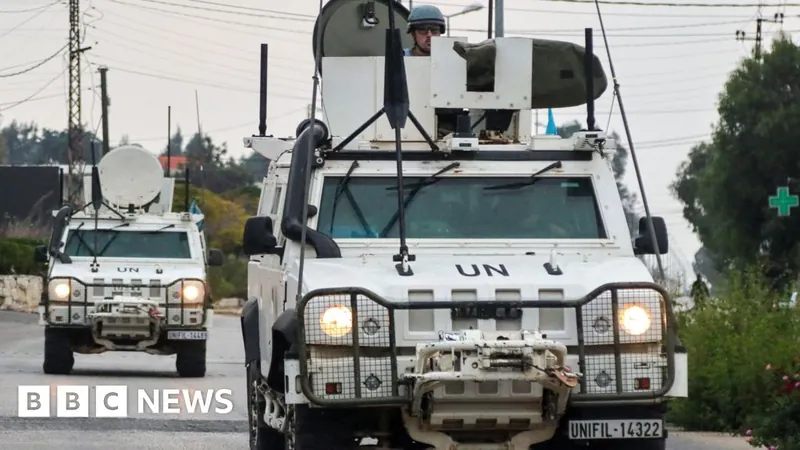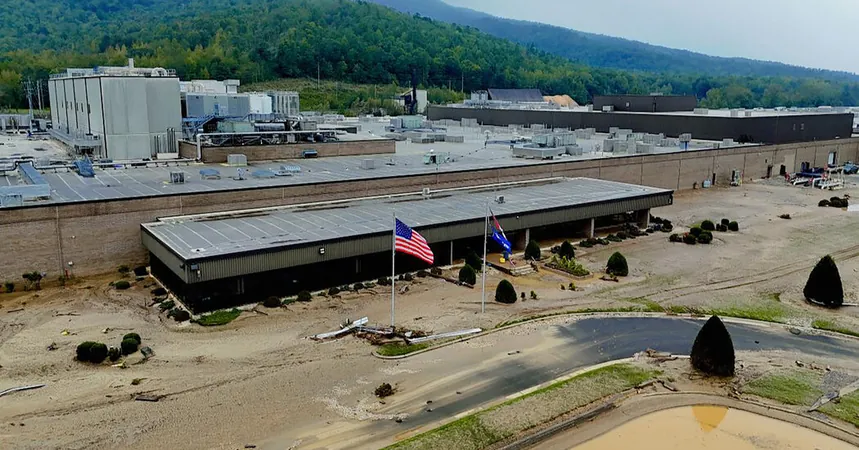
Biden Demands Israel Halt Attacks on UN Peacekeepers Amid Escalating Conflict with Hezbollah
2024-10-12
Author: Ming
US President Joe Biden has made a forceful appeal for Israel to cease its attacks on UN peacekeepers amidst escalating tensions in Lebanon, particularly following two alarming incidents that occurred in just 48 hours.
On Friday, the Israel Defense Forces (IDF) admitted their involvement in a striking incident that left two Sri Lankan soldiers from the UN Interim Force in Lebanon (UNIFIL) wounded. This was compounded by another event a day earlier, where two Indonesian soldiers were injured after an Israeli tank fired in the vicinity of their observation tower.
The IDF claims to have acted in self-defense after identifying a perceived threat, stating that a full investigation will be conducted at the highest levels. However, this explanation has not quelled international outrage. France, Italy, and Spain issued a joint statement condemning Israel's actions as "unjustifiable," demanding an immediate halt to hostilities. Sri Lanka's foreign ministry echoed these sentiments, calling the assault "strongly condemnable."
Jean-Pierre Lacroix, the head of UN peacekeeping operations, suggested that some of the hostilities directed toward UN positions could have been deliberate. "We have evidence indicating that some attacks, including damage to UN equipment, appear to be direct fire," he asserted in an interview.
As Israel's military actions intensify in southern Lebanon, Klaxon shots echo across the border as missile exchanges with Hezbollah persist. On Friday alone, the IDF reported tracking around 100 rockets launched from Lebanon, alongside attempts by drones to infiltrate Israeli airspace.
Tragically, the repercussions of this ongoing conflict are being felt intensely within Lebanon. The Lebanese Ministry of Health reported devastating casualties, including the death of a two-year-old girl in an Israeli strike in Sidon, where a total of three fatalities were documented. Additionally, two Lebanese soldiers reportedly lost their lives during an Israeli attack on a military post, prompting Lebanese Prime Minister Najib Mikati to condemn the airstrike that struck civilian areas in Beirut, resulting in multiple casualties.
In the wake of these attacks, Prime Minister Mikati described Israel's actions as a "crime directed at the international community," reiterating the urgent need for global attention and intervention.
Tensions have reached a dangerous new high since Israel launched a ground invasion into southern Lebanon in response to ongoing rocket fire from Hezbollah, following incidents that began after Hamas’s assault on southern Israel last October. Reports indicate that more than 2,000 people have died in Lebanon as a direct consequence of the renewed hostilities, which have displaced hundreds of thousands of civilians.
The situation remains volatile as Israel maintains that UNIFIL has failed to stabilize the region, suggesting that peacekeepers should withdraw to give the IDF more room to operate against Hezbollah. However, UN officials have firmly stated that peacekeeping forces will remain positioned, with around 10,000 personnel from 50 countries currently deployed in the region.
Despite calls for restraint from various nations and organizations, the cycle of violence shows no signs of abating. As both Israel and Hezbollah engage in exchanges across the border, international observers are increasingly alarmed by the grave humanitarian implications unfolding in Lebanon.
With hostilities escalating rapidly, the urgent question remains: what will it take for the international community to intervene meaningfully before the situation spirals further out of control?



 Brasil (PT)
Brasil (PT)
 Canada (EN)
Canada (EN)
 Chile (ES)
Chile (ES)
 España (ES)
España (ES)
 France (FR)
France (FR)
 Hong Kong (EN)
Hong Kong (EN)
 Italia (IT)
Italia (IT)
 日本 (JA)
日本 (JA)
 Magyarország (HU)
Magyarország (HU)
 Norge (NO)
Norge (NO)
 Polska (PL)
Polska (PL)
 Schweiz (DE)
Schweiz (DE)
 Singapore (EN)
Singapore (EN)
 Sverige (SV)
Sverige (SV)
 Suomi (FI)
Suomi (FI)
 Türkiye (TR)
Türkiye (TR)